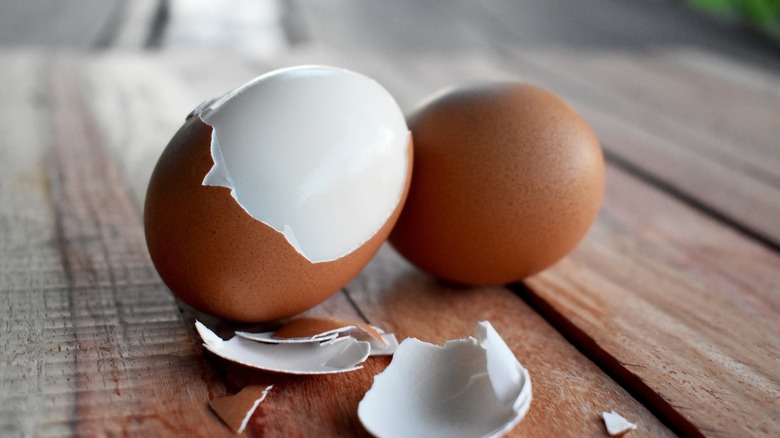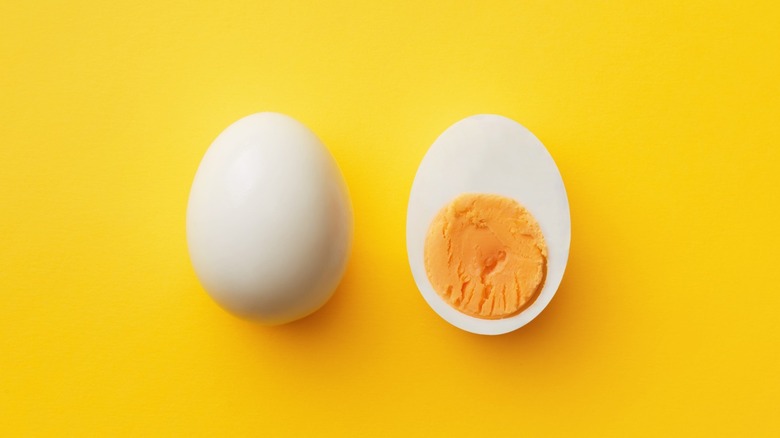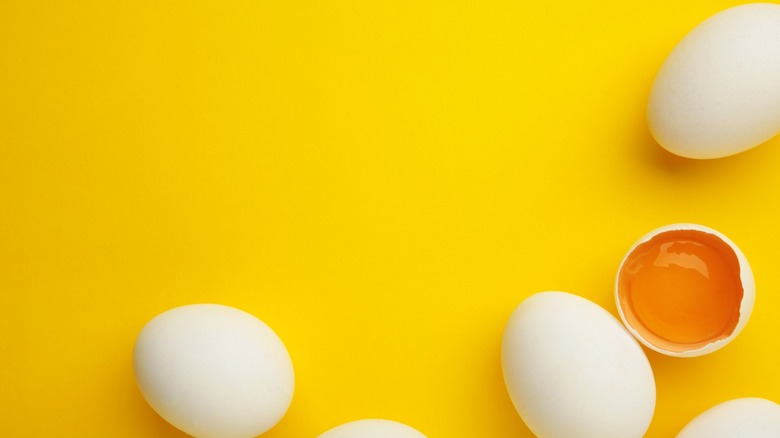How To Freeze Egg Yolks After Hard-Boiling Them
Cooking with recipes that require eggs doesn't always mean that the entire egg is necessary. Egg whites are often an essential component of a structurally sound baked good while yolks tend to be optional in these instances. On the flip side, a nice custard or carbonara sauce only uses the yolk, while the whites are left out of the equation. In the case of hard-boiled eggs, egg whites can be a delicious way of adding extra protein to a salad, but the yolk can be a bit extraneous and add an unwanted powdery or gooey texture. The question remains, though — what to do with all that extra yolk?
The answer is simple: Freeze it. This is the easiest to do after hard-boiling an egg, though it's not impossible to salvage runny yolks from uncooked eggs. In the case of a hard-boiled egg, you can remove the egg yolks and place them on a baking sheet, then stick them in the freezer for a couple of hours. Three hours is probably enough to do the trick, but you can leave them in there overnight to make sure the job is done. Afterward, transfer them to a freezer bag and use them within a month.
What to do with frozen egg yolks
Remember to keep your egg yolks cold as they thaw out to lower the risk of growing bacteria. Like with frozen meat, let them slowly warm up in the refrigerator for a couple of hours or run them under cold tap water, then use them immediately after they're softened up. Since you've already had your egg white salad at this point, try packing a sandwich with your leftover yolks for a nice jam-like consistency (it helps to mix in some mayo here) or hard-boil more eggs and make a double-packed filling of deviled eggs.
It's important to note that hard-boiled yolks will fare significantly better than hard-boiled whites in the freezer. While yolks may thicken up a bit, their consistency generally won't change much. The same is not true for the whites, which can morph into a consistency that's both tough and watery. If you're going to use one part of an egg immediately after hard-boiling it, make sure it's the white.
How to freeze uncooked egg yolks
Freezing uncooked egg yolks is slightly more difficult than freezing hard-boiled yolks, though it's arguably more versatile. Because they have a more liquid consistency, whipping raw yolks with a bit of salt and sugar is essential to help preserve their taste and structure. Raw yolks are bound to thicken up when frozen, so this is a vital step in ensuring that they don't turn into jelly.
After thawing them out the same way you would for a hard-boiled yolk, use them in a recipe that requires cooked yolk. The more whipped and diluted the yolk is, the better. Dishes like custard or lemon cord are perfect since they already have a gelatinous consistency, but stay away from recipes that use raw egg yolks like hollandaise sauce or Caesar salad dressing. It's just too much of a health risk to thaw out yolks and then consume them raw. As opposed to hard-boiled egg whites, uncooked whites are actually easier to freeze than the yolks, and don't require the same process of whipping and salting. To those who have never frozen eggs before, this entire concept may sound strange, but after a successful round of reuse, you'll discover that there's never any good reason to toss away a separate yolk or white.



